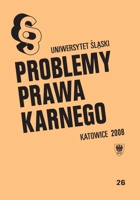Funkcjonowanie zakazu "reformationis in peius" w związku z zaskarżeniem orzeczenia rozstrzygającego o roszczeniach cywilnych...
The functioning of the "reformationis in peius" prohibition in relation to the appeal of the adjudication adjudicating civil...
Author(s): Katarzyna SychtaSubject(s): Law, Constitution, Jurisprudence
Published by: Wydawnictwo Uniwersytetu Śląskiego
Keywords: The reformationis in peius prohibition; Civil claims; Penal proceeding; The prohibition of worsening the trial position; Crime – generated damages; Adhesive proceeding; The mistake of the law enforcement bodies and the judiciary; Penal
Summary/Abstract: The aim of the publication is a complex analysis of the problem of the functioning of the "reformationis in peius" prohibition, i.e. the prohibition of worsening the trial position of one subject referring to the adjudication released in penal-trial course of damage and harm compensation. The compensation system realized in the course of the penal trial consists in the claims investigated in the adhesive proceeding leading to gaining compensation making up for the crime-generated damages, as well as due to the title of the mistake of the law enforcement bodies and the judiciary, made in the cases of crimes, offences or in the course of the proceeding in the context of penal liability of the opposition activists. The subject scope of the "reformationis in peius" penal-trial prohibition was resigning from the attempt to specify the adjudication, the complaints of which cannot be increased in the enriched course of the trial. Thus, the consequence of penal-trial limits is also the prohibition of the increase of the nuisance threatening the defendant resulting from the adjudication of the issue of civil liability. The subject scope of penal-trial barriers restricting the freedom of a factual adjudication protects only the accused, in danger of the use of penal and civil consequences of the offensive behaviour. However, the regulations standardizing the adhesive proceeding, comprise a clause allowing for the use of civil-trial procedural regulations when there are no appropriate norms in the penal procedure. As a result, a civil plaintiff demanding in the penal proceeding the compensation for crime generated damages, will be covered by a penal-trial mechanism blocking an unlimited possibility of reforming the appeal adjudication. The prohibition of worsening the trial position of the person appealing from the adjudication adjudicating in the adhesive proceeding remains up-to-date also when the trial in the subject of the penal liability finished in a way excluding the penal-trial protection of the accused appealing to the court. According to the art. 434 of the act 3 and 443 of the penal code, the possibility of changing the direction of appeal profitable to the accused happens when he/she was leniently punished in view of his/her cooperation with the law enforcemen bodies or the questioned adjudication was released as a result of a consensus agreement with the judiciary. The protective system will work also when the abrogations concerning the compensation benefits, and penal-trial motives of the proceeding are given to the appropriate civil court. The subject demanding the compensation of damages caused as a result of a defective functioning of the law enforcement bodies and the judiciary has a status of an autonomous side of the penal-trial compensation proceeding. "Prima facie", should not make use of the preventive measures reserved for a typical passive side of the penal trial […].
Journal: Problemy Prawa Karnego
- Issue Year: 26/2008
- Issue No: 1
- Page Range: 9-82
- Page Count: 74
- Language: Polish

